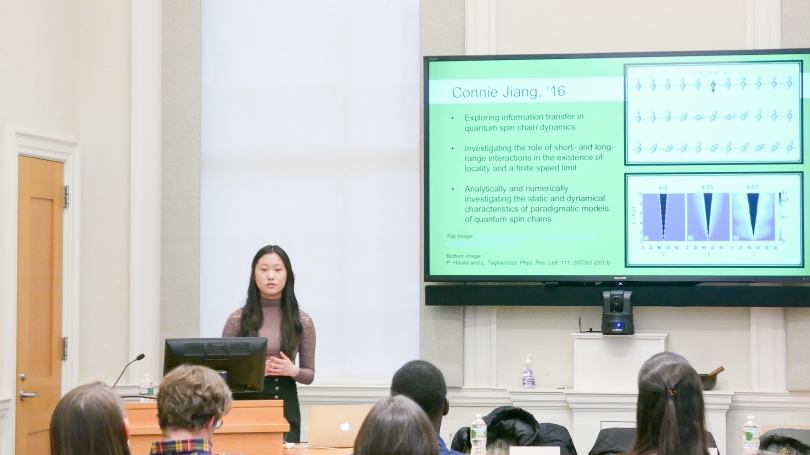
Connie Jiang ’17 began working on her project, titled, “Investigating the Spread of Correlations in Quantum Spin Chains with Long Range Interactions,” last summer. (Photo by Danny Kim ’18, Web Services Student Content Corps).
While conducting her research, Connie Jiang ’17 has discovered a world that is not nearly as clean-cut and structured as her physics and math classes. A recipient of the Penelope W. and E. Roe Stamps IV Leadership Scholar Award, a monetary award to be used for research and learning beyond the classroom, Jiang has been working since last summer on her project, titled, “Investigating the Spread of Correlations in Quantum Spin Chains with Long Range Interactions.” Jiang, a physics major and mathematical physics minor from Massachusetts, is working with Dartmouth Professor of Physics Lorenza Viola and Professor Lea Ferreira dos Santos at Yeshiva University, in New York. She will be defending her senior honors thesis, which is similar to her Stamps project, at the end of the 2016 spring term.
Jiang recently spoke to the Web Services Content Corps Team about her project.
How did your project come to fruition?
The topic that we’re interested in is something that my professor has looked at before—specifically quantum spin chains with long range interactions. There have been a lot of recent experiments that have made it possible to experimentally study quantum systems with long range interactions. The systems we are interested in have become viable for study in the laboratory.
Why does your project matter? How can others benefit from your research?
We’re trying to answer some fundamental questions in quantum physics that can tell us a lot how information can be transferred through a quantum spin chain, which can have a lot of applications in a lot of different quantum systems. People are working very hard, for example, to build quantum computers, and understanding quantum spin chains better can also tell us more about how quickly information can travel through a chain.
Where and how have you conducted your research?
Because we have a theoretical physics project, I'm very much staying put. A lot of the work that we can do is just math, with pencil and paper or on a computer. I did, over the summer, go to New York to visit my other research advisor at Yeshiva University. Otherwise, I've been working a lot in my office or in the library.
What has been the biggest surprise or obstacle that you have faced while working on your project?
Learning to do research has been a really big experience. For example, in most math and physics classes, everything is very neat and clean. You're given a problem and you know you have all the information to solve the problem. All you need to do is sit down, figure it out, solve it, and then hand it in and move on. When you're doing research, it's not nearly as clean. Everything is so much more complex. In classes, you have to solve the problems that you're given, whereas in research, the problem is just figuring out the problem in the first place.
What is the value of research, and the value of research with experiential learning?
At least in the field of theoretical physics, my research would count as an experiential learning project. For the first time, I get to go out and take all the things I’ve learned from all of my classes and apply it to something completely new—to apply it to problems that people haven’t been able to solve before.
What are your plans for after graduation?
After I graduate in the spring, I’m planning on going to graduate school to do a PhD in theoretical physics and study condensed matter theory.
The Penelope W. and E. Roe Stamps IV Leadership Scholar Awards provide undergraduate students an opportunity to create and pursue their own experiential learning project. Each Stamps Scholar receives up to $10,000 over the course of their final two years at Dartmouth. Half of the funds come from Dartmouth, the other half from the Stamps Foundation.